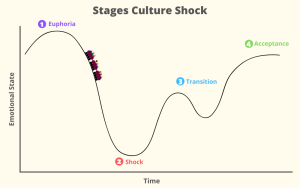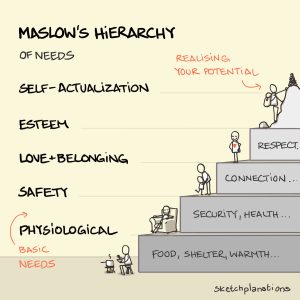The Silent Voice of Sadness
Life is an ever-evolving journey filled with twists and turns, and as we navigate through its various phases, our living circumstances often undergo significant, and oftentimes “silent”, changes. While suffering as a condition is unavoidable and a key part of human existence (Arthur Schopenhauer), and change is a natural part of life, both can sometimes become a silent catalyst for mental health challenges such as depression, anxiety and others. ... In other words, it is the silent voice of sadness.
If you Google the word 'Depression', you will find a lot of information available that can be overwhelming. I thought it would be helpful to keep this article straightforward and simple. That doesn't mean I don't think you, the reader, can't handle the 'complication', quite the contrary.
I guess by now you know that I like to add a bit of 'salt and pepper' to my articles, giving information a different perspective and applying theory to everyday situations. This time we will explore some of the elements of the complicated relationship between changing life circumstances and the onset of depression, which we can also associate to a profound sadness that has no voice and no easy way of expressing itself.
Loss of Social Connections
Loss is an important aspect of the life cycle. We need to come to terms with the fact that life comes together with constant losses and grief. In 1969, Elisabeth Kübler-Ross described five common stages of grief (loss): Denial, Anger, Bargaining, Depression and Acceptance. Losses not only refer to the death of someone that is important to us, but it is also associated to losing social connections. Let’s not forget the pivotal role that relationships play in our lives, which is mainly providing support, companionship, and a sense of belonging. The absence of social connections that once served as pillars of support can leave individuals feeling adrift and emotionally vulnerable, paving the way for depressive symptoms to emerge.
Changes in living circumstances, such as divorce, the end of a long friendship, the loss of a job, can also result in a profound sense of sadness, grief and depression that sometimes people choose to experience in silence.
The Impact of Relocation
One of the most profound changes in living circumstances is the act of relocation. Whether it's moving to a new city, country, or even a different neighbourhood, the disruption of familiar surroundings can trigger a cascade of emotions.
The stress and sadness associated with the loss of what we left behind and adapting to new circumstances, may contribute to the development of depression. It is inevitable that we will move through different stages as we navigate our new life. Some days will be better, and some days will be worse. Being aware of this and taking the time to pay attention to our emotions and their significance, will help us to move to a place of acceptance and integration, enabling us to cope in a healthier manner the challenges of building a new life.
Financial Strain and Instability

Maslow suggests that human needs are organised into five levels, one being a prerequisite for the next. The first level describes the Physiological Needs or basic needs for physical survival, such as air, food, shelter, etc. Once these needs are met, we move to the next level which refers to Security Needs. The latter relates to emotional security, financial security, stability, health and well-being, etc.
Individuals may find themselves overwhelmed by the pressures of financial hardship, impacting their ability to meet both ‘Physiological and Safety Needs’ for themselves and their families. Some may not want to share this heavy burden with their partner and prefer to experience in silence the constant worry about making ends meet as well as the fear of an uncertain future. All this can affect their mental health, hence leading to chronic stress, deep sadness, helplessness and hopelessness which are well-known precursors to depression.
Role Transitions and Identity Crisis
Life's transitional periods, such as retirement, aging, becoming an empty-nester, or changes in marital status, can lead to shifts in roles and identity.
This transition period can trigger a feeling of unfulfillment from both the external and internal world. This can be accompanied by strong feelings of dissatisfaction, anxiety and depression, as we endure loss, pain and grief in the process of acknowledging a different sense of self.
When individuals base a significant portion of their identity on their roles (e.g. being a parent, a professional or a spouse), any disruption in these have the potential to trigger an identity crisis. The loss of meaning, purpose and direction in life can contribute to feelings of emptiness and despair, laying the groundwork for depression to take hold.
Cultural Adjustment and Alienation
Physical, social and cultural dimensions are fundamental aspects of how we learn to relate to ourselves and others. There is a need to feel that we belong to a certain group that we identify with. We develop an attachment to a group who we share similar beliefs, morals and culture, making us feel that we have a clearly defined place in society.
People undergoing cultural changes, such as immigrants or individuals experiencing a shift in cultural context, the process of adaptation can be particularly challenging. Culture shock, language barriers, and the struggle to assimilate into a new societal framework can contribute to feelings of alienation. The lack of a support system makes it even more difficult, as they live this process in silence, without their voice being heard. The sense of not belonging or not being understood can be emotionally taxing, potentially leading to the development of depression as individuals grapple with the complexities of cultural adjustment.
Tackling Chronic Health Conditions
Living with chronic health conditions can significantly disrupt daily life and general well-being. The physical limitations imposed by these conditions, coupled with the emotional toll of dealing with a state of internal turbulence and managing ongoing health challenges, can contribute to the development of depression. These complex circumstances may trigger an existential questioning about life and its purpose that, together with the constant juggling of medical appointments, treatment regimens and the uncertainty about future health outcomes, can evoke deep sadness and create a pervasive sense of hopelessness and helplessness.
In conclusion, the relationship between constant changes in living circumstances and depression is multifaceted and complicated. A deeper understanding of the complexity and impact of these interactions is helpful in the therapeutic process. It is crucial to recognize that everyone's journey is unique, and that the impact of these changes varies from person to person.
Seeking support from mental health professionals, building a strong social network and developing resilience in the face of life's uncertainties can help people cope with these challenges and mitigate the risk of depression.
Depression causes a decline in functional well-being, which affects many areas of our lives. Seeking support from mental health professionals, building a strong social network and developing resilience in the face of life's uncertainties can help us cope with these challenges and mitigate the risk of depression. Remember that, recognising and accepting the emotional cost of constant changes in our life circumstances, is the first step in fostering mental and emotional well-being in a world that is constantly changing. Do not be silent, find your voice and let it express itself.
If you are going through a difficult time in your life and you would like to work on overcoming your state of anxiety and depression, do not hesitate to contact me to help you understand how we can work together.


